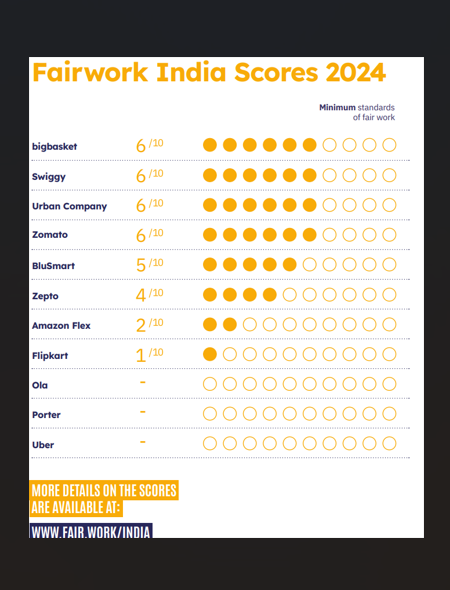Labour Standards in India's Platform Economy: An Assessment of the Fairwork India Report 2024
The 2024 Fairwork India report evaluates labor standards across 11 digital platforms operating in India. The report benchmarks platforms against five principles: Fair Pay, Fair Conditions, Fair Contracts, Fair Management, and Fair Representation.
Shreelee
10/17/20243 min read
Title: Labour Standards in India's Platform Economy: An assessment of the Fairwork India Report 2024
Abstract The 2024 Fairwork India report evaluates labor standards across 11 digital platforms operating in India. The report benchmarks platforms against five principles: Fair Pay, Fair Conditions, Fair Contracts, Fair Management, and Fair Representation. This article delves into the findings, highlighting persistent challenges such as non-compliance with minimum wage laws and the absence of worker representation. The article further discusses potential legal frameworks and regulatory measures that could be implemented to enhance worker protections in the platform economy.
Introduction The rise of gig and platform work in India has been a critical development in recent years, significantly altering traditional employment structures. The reliance on digital labor platforms—such as food delivery, ride-hailing, and logistics—has expanded access to employment for many workers. However, the absence of adequate regulatory frameworks has raised concerns about working conditions, particularly regarding pay equity, worker safety, and representation. The 2024 Fairwork India report provides a comprehensive evaluation of these issues, utilizing a five-principle framework to score platforms on labor standards. This paper analyzes the key findings of the report, offering insights into the current state of the platform economy and recommendations for future improvements.
Methodology The Fairwork India report employs a comprehensive methodology based on desk research, platform engagement, and interviews with 440 platform workers across five major Indian cities: Bengaluru, Chennai, Delhi, Kochi, and Thiruvananthapuram. Each platform was evaluated against five principles, with scores awarded based on compliance with thresholds outlined by the Fairwork framework. Platforms received a maximum of 10 points, with each principle comprising two sub-points.
Key Findings
Fair Pay: Only two platforms—bigbasket and Urban Company—were awarded points under this principle. Both platforms have instituted policies ensuring that workers earn at least the local minimum wage after accounting for work-related costs, such as fuel and vehicle maintenance. However, no platform met the second threshold, which requires payment of a living wage. This finding highlights the financial precarity faced by platform workers, particularly in an inflationary environment where costs are increasing, but wages remain stagnant.
Fair Conditions: Seven platforms, including Amazon Flex, Swiggy, and Zepto, received points for providing safety equipment and conducting periodic safety training. However, only five platforms, such as Swiggy and Zomato, met the second threshold, which requires platforms to provide accident insurance and income compensation in cases of illness or injury. While these efforts represent progress, the report emphasizes that many workers remain vulnerable to workplace hazards, particularly those involved in high-risk tasks such as delivery driving.
Fair Contracts: Most platforms, including BluSmart and Zepto, were awarded points for ensuring that their contracts are accessible and comprehensible. However, only a few platforms met the second threshold by ensuring that contracts did not impose unfair liabilities on workers. This includes the lack of transparency in dynamic pricing mechanisms and the absence of adequate protection for subcontracted workers. This issue is particularly significant for workers who rely on platforms for their livelihood but face disproportionate risks and liabilities.
Fair Management: Platforms such as Swiggy and Urban Company introduced grievance redressal mechanisms, providing workers with a channel to appeal disciplinary actions. Additionally, these platforms institutionalized regular external audits to ensure their management systems were free from bias. Despite these improvements, many platforms still lack adequate transparency in algorithmic decision-making, particularly regarding how tasks are allocated and how worker performance is evaluated.
Fair Representation: No platform scored any points under this principle, reflecting the lack of formal recognition of worker collectives or unions. While there has been a rise in worker protests and strikes across the country, platforms remain reluctant to negotiate with collective bodies. The absence of worker representation is a significant gap in labor protections, as it limits workers' ability to advocate for better conditions and fairer treatment.
Discussion The Fairwork India 2024 report highlights the uneven landscape of labor standards within the platform economy. While some platforms are making incremental improvements, the overall findings underscore a lack of comprehensive protections for platform workers. The failure to meet the living wage standard, coupled with inadequate worker representation, suggests that many platforms are prioritizing operational efficiency over worker welfare.
Recent legislative efforts, such as the Karnataka and Jharkhand gig worker bills, have the potential to address some of these gaps. However, the report raises concerns about the enforceability of these laws and the willingness of platforms to comply with new regulations. The introduction of social security measures and algorithmic transparency requirements are critical steps toward ensuring fair treatment for platform workers, but without strong enforcement mechanisms, these reforms may fall short of their intended impact.
Conclusion The platform economy in India is at a crossroads. While digital platforms have created new employment opportunities, they have also introduced significant challenges related to fair wages, safety, and worker autonomy. The Fairwork India 2024 report provides a crucial benchmark for evaluating labor standards within this rapidly evolving sector. To build a fairer platform economy, policymakers must prioritize the enforcement of minimum wage laws, worker safety regulations, and collective bargaining rights. Future research should continue to monitor platform compliance with these standards and advocate for stronger regulatory frameworks that protect the rights and livelihoods of platform workers.
References
Fairwork India. (2024). Fairwork India Report 2024: Labour Standards in the Platform Economy.
Fairwork Foundation.
International Labour Organization (ILO). (2022). Digital Labour Platforms and the Future of Work.


